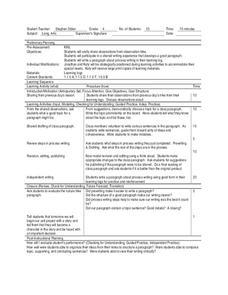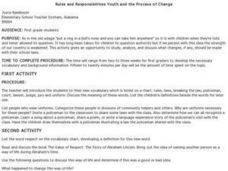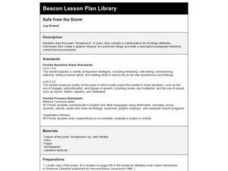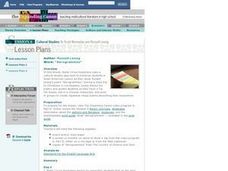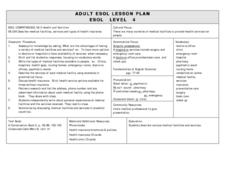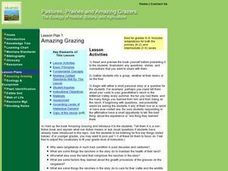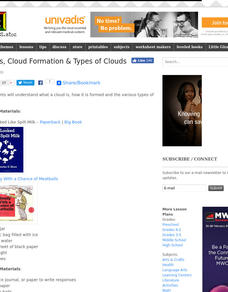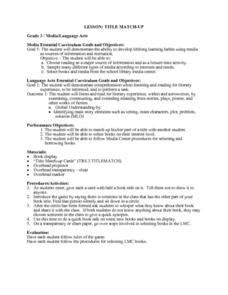Curated OER
Writing Crazy Crayons
Second graders observe the workings of an assembly line. They classify old crayon pieces by color, melt them in candy molds, package them, and produce advertising literature to sell the product. Students share their work with the class.
Curated OER
Creative Writing
Fourth graders participate in an observation hike in this lesson. They orally share observations from their hike, and develop a paragraph in a shared writing exercise. Finally, the write their paragraph about process writing in their...
Curated OER
Rules and Responsibilities Youth and the Process of Change
First graders learn vocabulary in regards to laws, courts, and policeman. They read and discuss the book, The Value of Respect: The Story of Abraham Lincoln. An attorney visits the classroom and discusses the roles of judges and juries.
Curated OER
Safe from the Storm
Fourth graders read the poem "Snowbound" after brainstorming what a place of refuge is and why it's needed. They, in pairs, meet and write a list of ten attributes that describe a refuge. They write a paragraph describing the look, feel,...
Curated OER
"Aerogrammes"
High schoolers examine Asian American culture through the analysis of the poem, 'Aerogrammes.' They watch a video, read and discuss the poem, take a field trip to Chinatown, and write a poem about their Chinatown experience.
Curated OER
Supreme Court Newspaper
Young scholars examine the purpose and responsibilities of the Supreme Court and its justices. In groups, they research a specific case and identify how the Supreme Court affects their lives. Using the information they find, they...
Curated OER
The Mysterious Tadpole
Second graders examine books written by Steven Kellogg, looking for similarities in his illustrations. They also look at images found on the Internet. They listen to a read aloud of The Mysterious Tadpole up to the point where the eggs...
Curated OER
Sherlock Shell and the Case of the Missing Chicken
Students read and discuss literature in class. They produce a script based upon the model shared during reading and discussion. Students shoot scenes for a final video project.
Curated OER
Elders As Resources
Students engage in a activity that uses discussion groups for communication. The focus of the activity is upon the respect for authority that should be given to older adults. Students engage in class discussion about the information that...
Curated OER
San Francisco, Ahoy!
Fifth graders analyze paintings that share a common theme of San Francisco as seen by some of the first travelers who arrived there. In this art history lesson plan, 5th graders consider the experiences involved with the arrival to a new...
Curated OER
Introduction to Graphical Representation of Data Sets in Connection with Nuclear Decay
Students record data, make observations, and share in experimentation and discussion of numerical experiments.
Curated OER
Home Healing and Family Stories
Students explore their family history by examining home remedy traditions. They read and discuss a handout about home remedies, conduct an interview with a family member, and complete an interview worksheet.
Curated OER
Communtiy Medical Facilities
Students describe various medical facilities and the services they provide. Working in pairs, students research and list the location and telephone number of community medical facilities and the services they provide. Independently,...
Curated OER
Amazing Grazing
Students discuss their experiences on a ranch. As a class, they tell the best part of their experiences or one thing they gathered from being on the ranch. They listen to the story and identify five items to focus on in the reading and...
Curated OER
Asian-American History for Grades 6-8
Students use web technology to access American history and the Asian-American experience. They evaluate journals as historical artifacts, especially the concept of firsthand account vs. history text. Students discuss Asian American...
Curated OER
Getting to Know You
Students complete an getting to know each other activity. In this personal names lesson, students play a name game, read a book about names, and then discuss why names are important. Students design a name card on oak tag rectangles and...
Curated OER
Electricity – Ohm’s Law
Students investigate the relationship between voltage and current. In this physics lesson, students observe and collect data from the experiment. They graph the result and share them to class.
Curated OER
An Investigative Task
Learners read an article about statistics. In this statistics lesson, students are given a detailed overview about statistics and what it entails. This lesson is more informational and hands on.
Curated OER
Clouds
Students discover how clouds form. They use the internet to read about the formation of clouds. They work together in groups to create their own clouds. They identify and label the four cloud types.
Curated OER
Internment of Japanese Americans
Students study the Japanese-American experience in the western United States during World War II. They view a video, "Japanese Relocation" and take notes on arguments in favor of internment. They share their notes and new vocabulary...
Curated OER
Immigration to the United States
Students work together as a class to create a videotape examining their different family histories. They interview their families about their experiences immigrating to America. They draw illustrations of their family to be included on...
Curated OER
Paper
Students study the process of creating paper. They read and discuss a flier and visit centers in small groups to study Paper Fun, Historical Paper, What Paper Is Made Of, and Homemade Paper. After visiting each center, they share the...
Curated OER
Title Match-Up
Third graders are introduced to a game in which each card they receive will have half of a book title on it. They find the person who has the other half of the title and they sit down in a circle. Students when whisper what they know...
Curated OER
Using the Analects to Solve Modern American Problems
Sixth graders read modern American political questions and discuss how Confucius' analects might be applicable to the U.S. in the 21st century and in addressing these questions.



